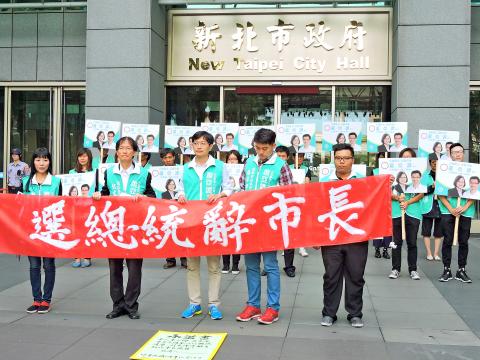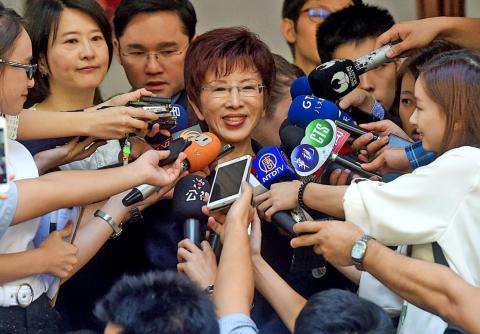Chinese Nationalist Party (KMT) Chairman Eric Chu (朱立倫) yesterday apologized for making the “reluctant, but necessary decision” to oust Deputy Legislative Speaker Hung Hsiu-chu (洪秀柱) as the party’s presidential candidate at a special party congress scheduled for Saturday.
“As chairman of the KMT, I cannot shift the blame for the party’s ongoing turmoil and dismal election campaign prospects to others. It is due to a lack of effort and communication on my part,” Chu, who is also New Taipei City mayor, said on the sidelines of a New Taipei City council meeting in the morning.
Chu apologized to his KMT comrades, before expressing his “sincerest apology” to Hung for what has happened and the KMT’s decision.

Photo: Lai Hsiao-tung, Taipei Times
A formal apology, along with a detailed explanation of the whole issue, is to be issued after today’s regular weekly meeting of the KMT’s Central Standing Committee and again after the party congress on Saturday afternoon, Chu said.
Chu’s comments came after Hung’s adamant refusal to quit the race, despite repeated calls from Chu and other party members for her to consider the “bigger picture.”
They also came after Hung on Monday night in a Facebook post questioned the rationale behind the KMT leadership’s criticism of her cross-strait policies — which she said advocate separate governance instead of division across the Taiwan Strait — for straying from the KMT’s stance and mainstream public opinion.

Photo: Chien Jung-fong, Taipei Times
“I am accused of deviating from mainstream public opinion simply because I told the truth. Is this really the case?” Hung wrote.
Asked whether Saturday’s congress would create solidarity or further division, Chu said that while unity does not necessarily translate into victory, a divided party almost always leads to failure.
“Various opinions have been voiced from within the party, which is why we intend to reach a consensus through the upcoming congress that is aimed at ‘forging consensuses and securing victory through party solidarity,’” Chu said.
He shrugged off reporters’ questions about whether he is going to replace Hung as candidate, with KMT Vice Chairperson Huang Min-hui (黃敏惠), a former Chiayi mayor, as his running mate.
“This is a hypothetical question. I will respect any decisions reached by the KMT’s representatives on Saturday as long as they are conducive to achieving consensuses and party unity,” Chu said.
When asked for comment about Chu’s apology, Hung — speaking on the sidelines of an afternoon legislative session — said whether an apology is made is not as important as conforming to the party’s internal democratic system.
She previously criticized the KMT headquarters’ decision to put her nomination to a vote at a special congress as detrimental to the KMT’s primary system.
Democratic Progressive Party presidential candidate Tsai Ing-wen (蔡英文) yesterday said that who the KMT nominates as its presidential candidate is not people’s main concern, because Taiwanese care more about having a different political party take the helm next year.

Intelligence agents have recorded 510,000 instances of “controversial information” being spread online by the Chinese Communist Party (CCP) so far this year, the National Security Bureau (NSB) said in a report yesterday, as it warned of artificial intelligence (AI) being employed to generate destabilizing misinformation. The bureau submitted a written report to the Legislative Yuan in preparation for National Security Bureau Director-General Tsai Ming-yen’s (蔡明彥) appearance before the Foreign Affairs and National Defense Committee today. The CCP has been using cognitive warfare to divide Taiwanese society by commenting on controversial issues such as Taiwan Semiconductor Manufacturing Co’s (TSMC, 台積電) investments in the

INVESTIGATION: The case is the latest instance of a DPP figure being implicated in an espionage network accused of allegedly leaking information to Chinese intelligence Democratic Progressive Party (DPP) member Ho Jen-chieh (何仁傑) was detained and held incommunicado yesterday on suspicion of spying for China during his tenure as assistant to then-minister of foreign affairs Joseph Wu (吳釗燮). The Taipei District Prosecutors’ Office said Ho was implicated during its investigation into alleged spying activities by former Presidential Office consultant Wu Shang-yu (吳尚雨). Prosecutors said there is reason to believe Ho breached the National Security Act (國家安全法) by leaking classified Ministry of Foreign Affairs information to Chinese intelligence. Following interrogation, prosecutors petitioned the Taipei District Court to detain Ho, citing concerns over potential collusion or tampering of evidence. The

‘COMPREHENSIVE PLAN’: Lin Chia-lung said that the government was ready to talk about a variety of issues, including investment in and purchases from the US The National Stabilization Fund (NSF) yesterday announced that it would step in to staunch stock market losses for the ninth time in the nation’s history. An NSF board meeting, originally scheduled for Monday next week, was moved to yesterday after stocks plummeted in the wake of US President Donald Trump’s announcement of 32 percent tariffs on Taiwan on Wednesday last week. Board members voted to support the stock market with the NT$500 billion (US$15.15 billion) fund, with injections of funds to begin as soon as today. The NSF in 2000 injected NT$120 billion to stabilize stocks, the most ever. The lowest amount it

NEGOTIATIONS: Taiwan has good relations with Washington and the outlook for the negotiations looks promising, Minister of Economic Affairs J.W. Kuo said Taiwan’s GDP growth this year is expected to decrease by 0.43 to 1.61 percentage points due to the effects of US tariffs, National Development Council (NDC) Minister Paul Liu (劉鏡清) said at a meeting of the legislature’s Economics Committee in Taipei yesterday, citing a preliminary estimate by a private research institution. Taiwan’s economy would be significantly affected by the 32 percent “reciprocal” tariffs slapped by the US, which took effect yesterday, Liu said, adding that GDP growth could fall below 3 percent and potentially even dip below 2 percent to 1.53 percent this year. The council has commissioned another institution